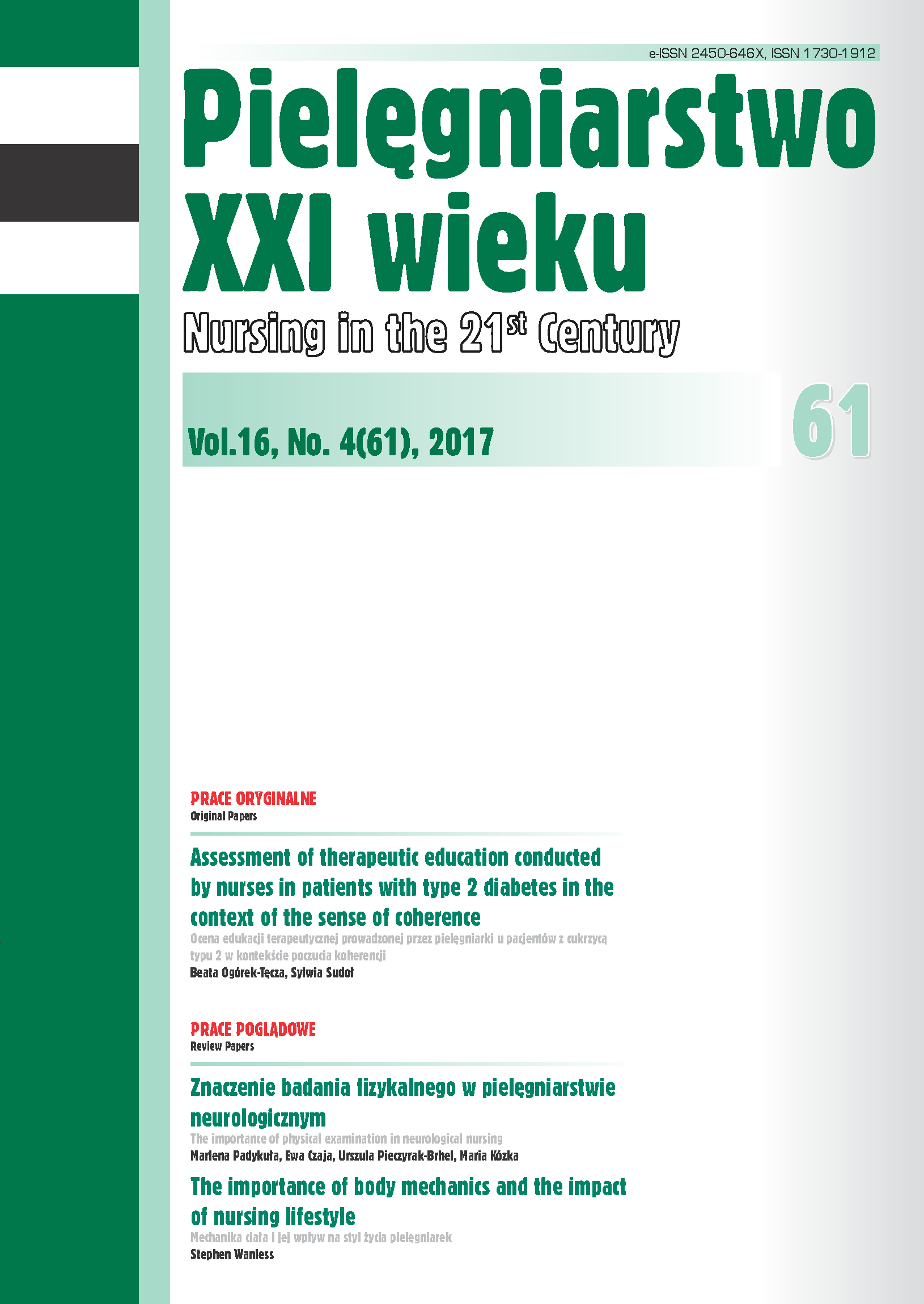System of nursing education and activity of nursing organisations in Germany – experience from 5th European Meeting of Nursing Students in Magdeburg
DOI:
https://doi.org/10.1515/pielxxiw-2017-0039Keywords:
nursing education, German nursing, nursing organizationsAbstract
SYSTEM OF NURSING EDUCATION AND ACTIVITY OF NURSING ORGANISATIONS IN GERMANY – EXPERIENCE FROM 5TH EUROPEAN MEETING OF NURSING STUDENTS IN MAGDEBURG
Introduction. On 20-26 October 2017, nursing students representing the Medical University of Lublin had a chance to take part in the fifth European Meeting and Conference of Nursing Students in Magdeburg.
Aim. This manuscript is aimed at analyzing the nurses' education system in Germany and presenting the activities of the German Nurses Association (DBfK).
Summary. There are several paths of education for nurses in Germany, academic education is one of the options. Nurses associated in the German Nursing Association (DBfK) strive to increase the interest of nurses in tertiary education, as well as make efforts to create a nursing self-government.
References
1. Cuber T. i wsp. Analiza porównawcza wybranych elementów systemu szkolnictwa pielęgniarskiego na poziomie licencjatu w Polsce i Finlandii. Problemy Pielęgniarstwa, 2011; 19 (3): 273-281.
2. Nowicki G. i wsp. Możliwości i bariery rozwoju zawodowego pielęgniarek w opinii uczestników specjalizacji w dziedzinie pielęgniarstwa ratunkowego. Problemy Pielegniarstwa, 2012; 20 (4): 473-479.
3. Cisoń-Apanasewicz U. i wsp. Opinie pielęgniarek na temat kształcenia podyplomowego. Problemy Pielęgniarstwa, 2009;17 (1): 32-37.
4. StatistischesBundesamt (2013): A - Umfragezur Anzahl der akademischausgebildeten Pflegekräfte. dostęp: http://de.statista.com/statistik/daten/studie/425556/umfra-ge/anzahl-akademisierter-pflegekraefte-in-deutschen-krankenhaeusern/ [dostep: 23.02.2016].
5. StatistischesBundesamt (2013): B-UmfragezumBedarf an akademischausgebildeten Pflegekräften. dostęp: (vgl. http://de.statista.com/statistik/daten/studie/425556/umfrage/anzahl-akademisierter-pflegekraefte-in-deutschen-krankenhaeusern [dostep: 23.02.2016].
6. Krankepflegegesetz (2003), dostep: https://www.gesetze-im-internet.de/krpflg_ 2004/KrPflG.pdf [dostęp: 19.11.2017].
7. Reform des Pflegeberufegesetz – dostęp: https://www.bundestag.de/dokumente/textarchiv/2017/kw25-de-pflegeberufe/509760 [dostęp: 19.11.2017]
8. Krankepflegegesetz (2003), dostęp: https://www.gesetze-im-internet.de/krpflg_2004/KrPflG.pdf [dostęp: 19.11.2017].
9. http://www.pflegeschulzentrum-goslar.de/cms/ [dostęp: 10.11.2017].
10. Altenpflegegesetz – dostep: https://www.gesetze-im-internet.de/altpflg/AltPflG.pdf [dostęp: 19.11.2017].
11. https://www.dbfk.de/de/ueber-uns/English.php [dostęp: 10.11.2017].
12. Konkret gefragt: Was kostetdas?/ Ile kosztuje przynależność do DBFK? - dostęp: https://www.dbfk.de/de/index.php [dostęp: 19.11.2017].
13. Mapa landów, na terenie których działają izby pielęgniarskie - dostęp: https://www.dbfk.de/de/themen/Pflegekammer.php [dostęp: 19.11.2017].
14. Anzahl der Pflegestudiengänge in Deutschland (2016): dostęp: http://www.studycheck.de/studium/medizin-gesundheitswesen/pflege [dostęp:11.02.2016].
15. Zarobki pielęgniarki w zależności od lat pracy (pracodawca z sektora państwowego) - dostęp: http://oeffentlicher-dienst.info/c/t/rechner/tvoed/p?id=tvoed-p-2017z& matrix=1 [dostęp: 19.11.2017].
Published
Issue
Section
License
Copyright (c) 2017 Authors

This work is licensed under a Creative Commons Attribution-NonCommercial-NoDerivatives 3.0 Unported License.




